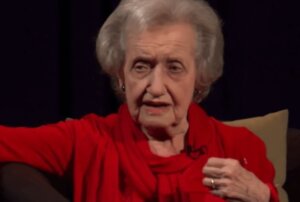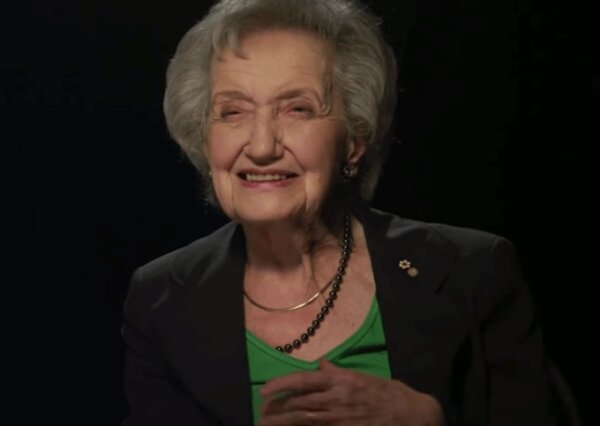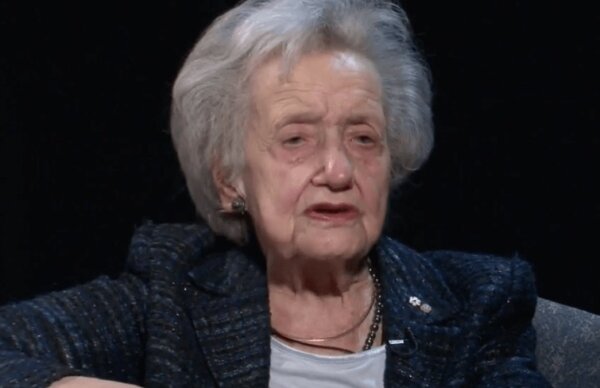Dr. Brenda Milner, the 101-Year-Old Neuroscientist

Dr. Brenda Milner is one of the brightest neuroscientists of recent decades. She revolutionized the way in which we understand human memory processes. She’s also conducted research regarding the way in which the two cerebral hemispheres interact. Indeed, her work has had a major impact on our understanding of cognitive learning, language, feelings, and emotions.
For 30 years, she focused her research on a patient who suffered significant short-term memory loss after a complicated operation. Dr. Milner discovered that, despite this fact, he retained his long-term memory and abilities from his remote past.
Her research with this patient contributed to the knowledge we have today about multiple memory systems. Let’s learn a bit more.

Her early life
Brenda Milner was born in Manchester, United Kingdom, in 1918. Her family was devoted to the arts, especially music. This was something they instilled in their daughter. Nevertheless, Brenda also showed great interest in science from a very young age.
In 1939, she graduated from Cambridge University in experimental psychology. In many interviews, Dr. Milner mentioned that she never lost her love of the arts. She felt she could continue to dedicate herself to them without having to give up science.
Academia
After completing her bachelor’s degree, Brenda Milner stayed in Cambridge. At the onset of World War II, she was recruited as a researcher for the British Air Force, along with some of her colleagues. In 1944, she married and left England for Canada. There, she began working at the University of Montreal in the psychology department. Later, she began her Ph.D. at McGill University with Dr. Donald Hebb as her tutor.
While she was working on her Ph.D., she was hired at the Montreal Neurological Institute-Hospital (MNI), where they studied epileptic patients. In 1952, she finished her Ph.D. and went on to investigate the intellectual effects caused by temporal lobe damage at McGill University.
Her work at MNI
Brenda decided to quit her job at McGill University to join the research team at MNI. There, she got the chance to work on the research that brought her worldwide recognition.
A fellow neurosurgeon from Connecticut invited Dr. Milner to go to Hartford to work with a patient who suffered severe epileptic seizures. The patient had undergone major experimental surgery. This operation drastically reduced his epileptic seizures. However, he experienced anterograde amnesia, which meant he was unable to retain any new memories.
Brenda Milner worked with this patient for the next 30 years. Her research was published in 1957. It became one of the most cited publications in the field of neuroscience.
Dr. Milner found that her patient could master new routines every day, though he didn’t remember learning them the next day. Nevertheless, his skills continued to improve, despite not being able to retain any recent memories. As a matter of fact, he was never able to remember his own name again.

The legacy of Dr. Brenda Milner
Today, more than 50 years after her findings, Dr. Milner is 101 years old. However, she’s never stopped opening up new paths in the field of neuroscience, especially in the field of memory, language processing, and interaction between the brain hemispheres.
Dr. Brenda Milner is widely recognized as a pioneer in the field of cognitive neuroscience. Her legacy has greatly improved our understanding of the inner workings of the human brain. Furthermore, she’s changed the way we understand both the world and ourselves.
Brenda Milner is an inspiration to many professionals in the field of neuroscience and psychology. In fact, her work has received worldwide recognition. She has more than 20 honorary degrees and has won many prestigious academic awards. She’s a fellow of the Royal Society of both the United Kingdom and Canada. Furthermore, she became the ninth woman to be inducted into the Canadian Science and Engineering Hall of Fame.
All cited sources were thoroughly reviewed by our team to ensure their quality, reliability, currency, and validity. The bibliography of this article was considered reliable and of academic or scientific accuracy.
Milner B. (2006). Understanding the human brain: a lifetime of dedicated pursuit. Interview with Dr. Brenda Milner. Interview by Chenjie Xia. McGill journal of medicine : MJM : an international forum for the advancement of medical sciences by students, 9(2), 165–172.
Squire L. R. (2009). The legacy of patient H.M. for neuroscience. Neuron, 61(1), 6–9. doi:10.1016/j.neuron.2008.12.023
Summers, Carol (2013) Brenda Milner Biography. Psychology Feminist Voices. Recuperado de http://www.feministvoices.com/Brenda-Milner/
This text is provided for informational purposes only and does not replace consultation with a professional. If in doubt, consult your specialist.








